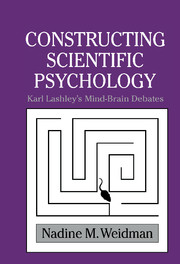Book contents
- Frontmatter
- Contents
- Preface
- Acknowledgments
- List of abbreviations
- Introduction
- 1 Lashley and Jennings: The origins of a hereditarian
- 2 Lashley, Watson, and the meaning of behaviorism
- 3 The pursuit of a neutral science
- 4 Neuropsychology and hereditarianism
- 5 Psychobiology and Progressivism
- 6 Psychobiology and its discontents: The Lashley-Herrick debate
- 7 Hull and psychology as a social science
- 8 Intelligence testing and thinking machines: The Lashley-Hull debate
- 9 Pure psychology
- 10 Public science and private life
- 11 Genetics, race biology, and depoliticization
- Epilogue: Lashley and American neuropsychology
- Appendix: Archives holding Lashley material
- Bibliography
- Index
Preface
Published online by Cambridge University Press: 16 September 2009
- Frontmatter
- Contents
- Preface
- Acknowledgments
- List of abbreviations
- Introduction
- 1 Lashley and Jennings: The origins of a hereditarian
- 2 Lashley, Watson, and the meaning of behaviorism
- 3 The pursuit of a neutral science
- 4 Neuropsychology and hereditarianism
- 5 Psychobiology and Progressivism
- 6 Psychobiology and its discontents: The Lashley-Herrick debate
- 7 Hull and psychology as a social science
- 8 Intelligence testing and thinking machines: The Lashley-Hull debate
- 9 Pure psychology
- 10 Public science and private life
- 11 Genetics, race biology, and depoliticization
- Epilogue: Lashley and American neuropsychology
- Appendix: Archives holding Lashley material
- Bibliography
- Index
Summary
This book began as my dissertation in the Department of Science and Technology Studies at Cornell University in the early 1990s. It was an exciting context in which to be studying the history of science: a radical skepticism toward scientific authority and scientific truth had begun to be taken as the sine qua non of serious historical scholarship. Science, my colleagues and I were taught, was thoroughly informed by society; scientific theories and practices were products of culture, not nature; laboratory experimentation was an elaborate ritual ripe for anthropological analysis. In our seminars and discussions, there was the pervasive sense that we were breaking with tradition, riding the wave of a revolutionary new approach to the field.
In part what made these new ideas so exciting was the debate that swirled around them. Not everyone at Cornell was a “social constructivist,” and the controversy about the relationship between science and culture was heated and ongoing. As a graduate student, I found it impossible not to define my work somehow in relation to the arguments I observed and participated in.
While I became persuaded of the usefulness of a social constructivist perspective in doing history of science, I was also acutely aware of the criticisms brought against it.
- Type
- Chapter
- Information
- Constructing Scientific PsychologyKarl Lashley's Mind-Brain Debates, pp. xiii - xivPublisher: Cambridge University PressPrint publication year: 1999

